牛津译林版英语版7Aunit4
译林版牛津初中英语7A一至四单元的重要词组、句型
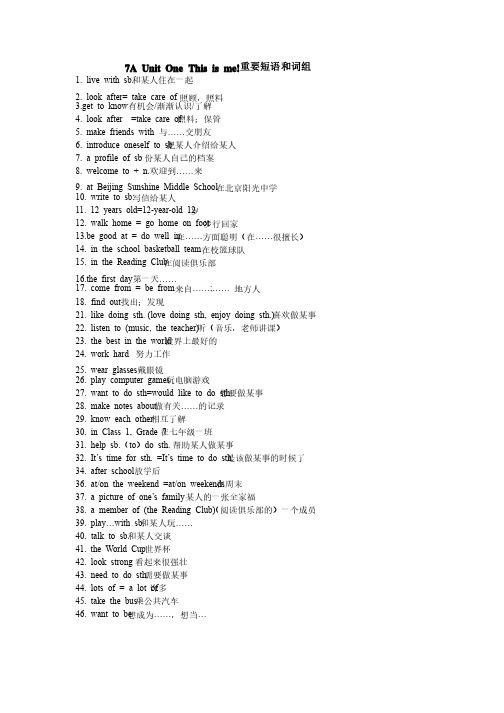
7A Unit One This is me!重要短语和词组 1. live with sb. 和某人住在一起和某人住在一起2. look after= take care of 照顾,照料照顾,照料3.get to know 有机会有机会/渐渐认识/了解了解4. look after =take care of 照料;保管照料;保管5. make friends with 与……交朋友交朋友6. introduce oneself to sb 把某人介绍给某人把某人介绍给某人7. a profile of sb 一份某人自己的档案一份某人自己的档案8. welcome to + n. 欢迎到……来9. at Beijing Sunshine Middle School 在北京阳光中学在北京阳光中学 10. write to sb. 写信给某人写信给某人11. 12 years old=12-year-old 12岁12. walk home = go home on foot 步行回家步行回家13.be good at = do well in 在……方面聪明(在……很擅长)很擅长)14. in the school basketball team 在校篮球队在校篮球队15. in the Reading Club 在阅读俱乐部在阅读俱乐部16.the first day 第一天第一天……17. come from = be from 来自……;…… 地方人地方人18. find out 找出;发现找出;发现找出;发现 21. like doing sth. (love doing sth, enjoy doing sth.) 喜欢做某事喜欢做某事22. listen to (music, the teacher) 听(音乐,老师讲课)听(音乐,老师讲课)23. the best in the world 世界上最好的世界上最好的24. work hard 努力工作努力工作25. wear glasses 戴眼镜戴眼镜戴眼镜 26. play computer games 玩电脑游戏玩电脑游戏玩电脑游戏 27. want to do sth=would like to do sth. 想要做某事想要做某事28. make notes about 做有关……的记录的记录29. know each other 相互了解相互了解30. in Class 1, Grade 7 在七年级一班在七年级一班31. help sb. (to )do sth. 帮助某人做某事帮助某人做某事32. It’s time for sth. =It’s time to do sth. 是该做某事的时候了是该做某事的时候了34. after school 放学后放学后放学后 36. at/on the weekend =at/on weekends 在周末在周末37. a picture of one’s family 某人的一张全家福某人的一张全家福38. a member of (the Reading Club) (阅读俱乐部的)一个成员(阅读俱乐部的)一个成员39. play…with sb.和某人玩…… 40. talk to sb. 和某人交谈和某人交谈41. the World Cup 世界杯世界杯42. look strong 看起来很强壮看起来很强壮43. need to do sth. 需要做某事需要做某事44. lots of = a lot of 许多许多45. take the bus 乘公共汽车乘公共汽车46. want to be 想成为想成为……,想当…Unit 2 Let’s play sports 重要短语和词组1. Let’s play sports 让我们进行体育运动吧让我们进行体育运动吧2. Do you like any sports? 你喜欢运动吗?你喜欢运动吗?3. like walking 喜欢散步喜欢散步4. Really? 真的吗真的吗5. walk to my bowl 走到我的碗边走到我的碗边6. many times a day 一天许多次一天许多次7. play volleyball 打排球打排球8. play tennis 打网球打网球9. play football 踢足球踢足球 10. enjoy swimming 喜欢游泳喜欢游泳喜欢游泳 11. What’s your favorite sport? 你最喜欢的运动是什么?你最喜欢的运动是什么?12. like doing sth 喜欢作某事喜欢作某事13. after school 放学以后放学以后14. what about you ?=How about you? 你怎么样?你怎么样?15. go swimming 去游泳去游泳16. every week 每周每周17. love sports 爱运动爱运动18 .very much 非常非常19. my favorite football player/star 我特别喜爱的足球运动员/明星明星20. 22 years old 22岁21. a new member of 一名新成员一名新成员2.2 Huanghe Football Club 黄河足球俱乐部黄河足球俱乐部23. come from Guangdong 来自广东来自广东24. live in Beijing 住在北京住在北京25. look strong 看上去很壮看上去很壮26. play football very well 足球踢得好足球踢得好27. in his free time 在他空余时间在他空余时间28. study English 学英语学英语29. enjoy listening to music 喜欢听音乐喜欢听音乐30. make sb happy 使某人开心使某人开心 make sb feel great使某人感觉棒 31. want to do sth =would like to do sth 想做某事想做某事32. play in the next World Cup 踢进下次世界杯踢进下次世界杯33. hope his dream comes true 希望他梦想成真希望他梦想成真34. a lot of interesting books 许多有趣的书许多有趣的书35. get up 起床起床36. watch ball games/matches 看球赛看球赛37. after-school activities 课外活动课外活动课外活动 38. . my hero 我的偶像。
牛津译林版英语7A Unit4 My day知识点归纳
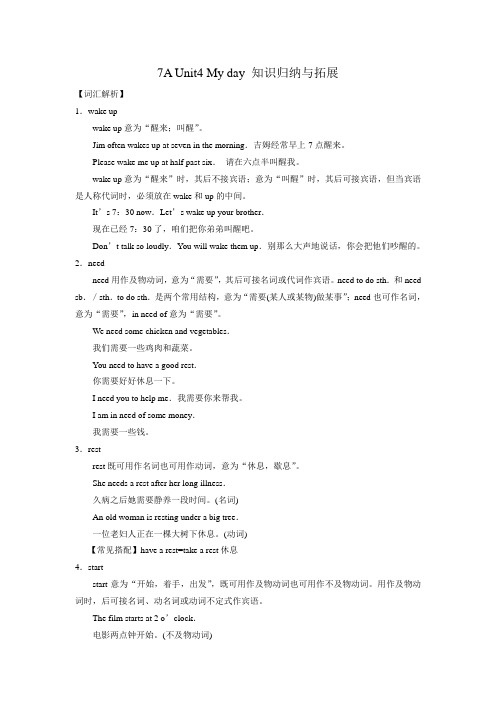
7A Unit4 My day 知识归纳与拓展【词汇解析】1.wake upwake up意为“醒来;叫醒”。
Jim often wakes up at seven in the morning.吉姆经常早上7点醒来。
Please wake me up at half past six.请在六点半叫醒我。
wake up意为“醒来”时,其后不接宾语;意为“叫醒”时,其后可接宾语,但当宾语是人称代词时,必须放在wake和up的中间。
It’s 7:30 now.Let’s wake up your brother.现在已经7:30了,咱们把你弟弟叫醒吧。
Don’t talk so loudly.You will wake them up.别那么大声地说话,你会把他们吵醒的。
2.needneed用作及物动词,意为“需要”,其后可接名词或代词作宾语。
need to do sth.和need sb./sth.to do sth.是两个常用结构,意为“需要(某人或某物)做某事”;need也可作名词,意为“需要”,in need of意为“需要”。
We need some chicken and vegetables.我们需要一些鸡肉和蔬菜。
You need to have a good rest.你需要好好休息一下。
I need you to help me.我需要你来帮我。
I am in need of some money.我需要一些钱。
3.restrest既可用作名词也可用作动词,意为“休息,歇息”。
She needs a rest after her long illness.久病之后她需要静养一段时间。
(名词)An old woman is resting under a big tree.一位老妇人正在一棵大树下休息。
(动词)【常见搭配】have a rest=take a rest休息4.startstart意为“开始,着手,出发”,既可用作及物动词也可用作不及物动词。
牛津译林版英语7AUnit4Grammar教学设计
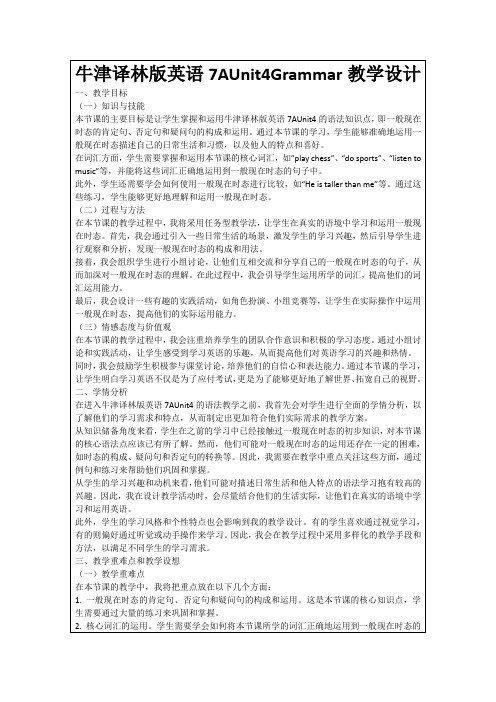
为了有效地突破上述重难点,我设想采取以下教学策略:
1.情境导入:通过展示一些日常生活的图片和场景,让学生初步感知一般现在时态的运用,激发他们的学习兴趣。
2.自主学习:让学生自主探究一般现在时态的构成和用法,鼓励他们提出问题和解决问题。
3.合作学习:组织学生进行小组讨论,让他们互相交流自己的一般现在时态句子,从而加深对一般现在时态的理解。
(二)过程与方法
在本节课的教学过程中,我将采用任务型教学法,让学生在真实的语境中学习和运用一般现在时态。首先,我会通过引入一些日常生活的场景,激发学生的学习兴趣,然后引导学生进行观察和分析,发现一般现在时态的构成和用法。
接着,我会组织学生进行小组讨论,让他们互相交流和分享自己的一般现在时态的句子,从而加深对一般现在时态的理解。在此过程中,我会引导学生运用所学的词汇,提高他们的词汇运用能力。
四、教学内容与过程
(一)导入新课
在导入新课时,我会利用多媒体展示一些与学生日常生活相关的图片和场景,如他们的兴趣爱好、生活习惯等。通过这些图片和场景,让学生初步感知一般现在时态的运用,激发他们的学习兴趣。
接着,我会用提问的方式引导学生思考一般现在时态的概念和用法。例如:“你们平时是怎么描述自己的日常生活的?是如何描述他人的特点和喜好的?”等问题。通过这些问题,让学生对一般现在时态有一个初步的了解。
其次,我会布置一些翻译练习,让学生将中文句子翻译为英文,并使用一般现在时态。这样的练习能够帮助学生将所学的语法知识与实际语言运用相结合,提高他们的语言表达能力。
此外,我还会布置一些小组作业,让学生合作完成。例如,让他们共同编写一个小对话,其中一个角色需要使用一般现在时态来描述自己的日常生活和习惯,另一个角色则需要用一般现在时态来提问和进行比较。
2024-2025学年牛津译林版七年级英语上册+Unit+4+新版+词汇表讲解
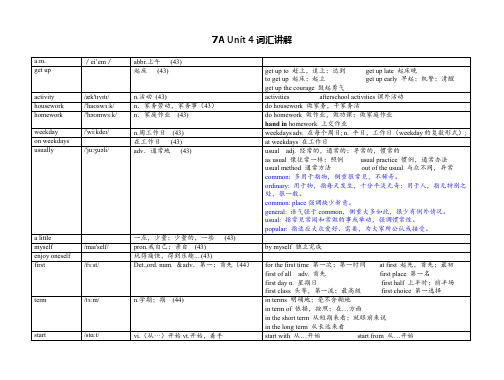
7A Unit 4词汇讲解a.m./ei’em/abbr.上午(43)get up 起床(43)get up to 赶上,追上;达到get up late 起床晚to get up 起床;起立get up early 早起;机警;清醒get up the courage 鼓起勇气activity/æk'tɪvɪtɪ/n.活动(43)activities afterschool activities课外活动housework/'haʊswɜːk/n.家务劳动,家务事(43)do housework 做家务,干家务活homework/'həʊmwɜːk/n.家庭作业(43)do homework 做作业,做功课;做家庭作业hand in homework 上交作业weekday/'wiːkdeɪ/n.周工作日(43)weekdays adv. 在每个周日; n. 平日,工作日((weekday的复数形式); on weekdays 在工作日(43)at weekdays 在工作日usually/'ju:ʒuəli/adv.通常地(43)usual adj. 经常的,通常的;寻常的,惯常的as usual 像往常一样;照例usual practice 惯例,通常办法usual method 通常方法out of the usual 与众不同,异常common: 多用于指物,侧重很常见,不稀奇。
ordinary: 用于物,指每天发生,十分平淡无奇;用于人,指无特别之处,很一般。
common: place强调缺少新意。
general: 语气强于common,侧重大多如此,很少有例外情况。
usual: 指常见常闻和常做的事或举动,强调惯常性。
popular: 指适应大众爱好、需要,为大家所公认或接受。
a little一点,少量;少量的,一些(43)myself/maɪ'self/pron.我自己;亲自(43)by myself 独立完成enjoy oneself玩得痛快,得到乐趣 (43)first/fɜːst/Det.,ord. num. &adv.第一;首先(44)for the first time 第一次;第一时间at first 起先,首先;最初first of all adv. 首先first place 第一名first day n. 星期日first half 上半时;前半场first class 头等,第一流;最高级first choice 第一选择term/tɜːm/n.学期;期(44)in terms 明确地;毫不含糊地in term of 依据,按照;在…方面in the short term 从短期来看;就眼前来说in the long term 从长远来看start /stɑːt/vi.(从···)开始vt.开始,着手start with 从…开始start from 从…开始n.开头,开端(44)at the start 开始at the start of 在…开始的时候start in 开始from the start 从一开始start up v. 开始;发动;突然站起;突然出现start at 开始于…;以…开始;因…吃惊start on v. 开始进行start for 出发,启程;动身去start out 出发;著手进行start off 出发,开始start point 出发点;起始点start doing/ to do sth 开始做某事writer/'raɪtə/n.作家(44)language/ˈlæŋɡwidʒ/n.语言(44)foreign language(s) n. 外语;外文language learning 语言学习second language 第二语言body language 身体语言natural language 自然语言spoken language 口语,口头语言;出声语言common language 共同语;公用语言native language 本国语言;本机语言;机器各单元间编码语言amazing/ə'mezɪŋ/adj.令人大为惊奇的(44)biology/baɪ'ɒlədʒɪ/n.生物学(44)biological adj. 生物学的;生物的living/'lɪvɪŋ/adj.活着的,活的(44)n. 生计;生存;生活living environment 生活环境living room 客厅,起居室living standard 生活水平,生活标准standard of living 生活水平;生活标准living space 生存空间living condition 生活条件;居住环境make a living 谋生,维持生活cost of living 生活费,生活费用for a living 为了生存;为…谋生living thing 生物living level 生活水平earn a living 谋生;活命living habit 生活习惯;生活方式alive: 其反义词为dead,指生命从奄奄一息到精力旺盛的各种状态。
牛津译林版7A Unit4 My day Grammar课件(共23张PPT)
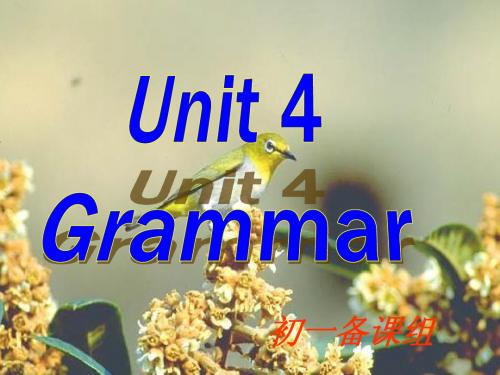
5在儿童节
6在六岁(2)
at six(years old), at the age of six 7给---写回信 write back to
would like sth, 9在秋天 in autumn 10玩得很高心have great fun
13. It is a good idea to go for a walk ____ a sunny morning.
on
15. The story happened _____ on a cold winter morning. 16. We’ll have a party ____ next week.
在早饭时
at breakfast
在13岁的时候
at 16(years old)/ at the age of 16
Tommy’s school life
in on in at on in on
Fill in the blanks with in, on or at where necessary. on Sunday. 1. We don’t go to school_______
8想要某物
11有许多时间做某事
have much time to do sth
12舞蹈课 13.去溜旱冰
dancing lessons go roller skating
学海拾贝
A. Prepositions of time
in: we use ‘in’ before _______________, parts of the day _______,seasons _______, ______. months years on: we use ‘on’ before:_____, days ______ dates at: we use ‘at’ before: _________, times of day
7A 译林牛津版Unit1-4重点词组和句型

7A U n i t1重点词组和句型复习一、重点词组1、一只电子狗an e-dog2、这只狗的主人themasterofthedog/thedog’smaster3、看书readbooks4、见到你很高兴Nice/Gladtomeet/seeyou!5、欢迎来到七年级一班Welcometo Class One,Grade Seven6、在七年级inGrade77、十二岁twelveyearsold8、一个8/11岁的女孩an eight/eleven–year–oldgirl9、长着乌黑的长发havelongblackhair10、又高又苗条tallandslim11、喜欢阅读/游泳/跳舞/运动like/love/enjoydoingsth12、踢足球/打篮球/排球playfootball/basketball/volleyball13、玩电脑游戏playcomputergames14、玩球playwithaball15、课后/放学后afterclass/school16、来自befrom/comefrom17、擅长begoodat/dowellin(sth/doingsth)18、让我们来见见我的新同学Let’smeetmynewclassmates.19、和家人住在南京livewithmyfam ilyinNanjing20、戴眼镜wearglasses21、所有的功课allthelessons22、让某人做某事Letsbdosth二、重点句型lieisanewstudent at SunshineMiddleSchool.米莉是阳光中学的一名新学生。
SheisanewstudentatHuaiyinMiddleSchool.2.Ihaveshorthair.=Myhairisshort.我长着短发。
Shehaslonghair.=Herhairislong.3.He isfrom Nanjing.=He comesfrom Nanjing.他来自南京。
牛津译林英语7A UNIT 4 选择题专项练习精选50题(包含答案)
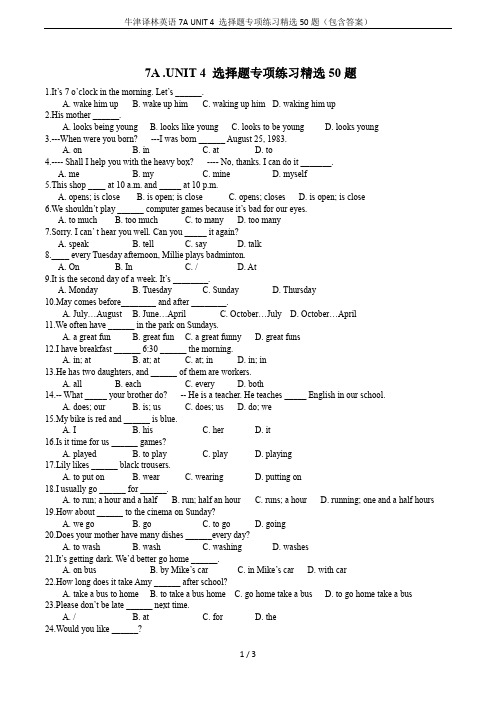
7A .UNIT 4 选择题专项练习精选50题1.It’s 7 o’clock in the morning. Let’s ______.A. wake him upB. wake up himC. waking up himD. waking him up2.His mother ______.A. looks being youngB. looks like youngC. looks to be youngD. looks young3.---When were you born? ---I was born ______ August 25, 1983.A. onB. inC. atD. to4.---- Shall I help you with the heavy box? ---- No, thanks. I can do it _______.A. meB. myC. mineD. myself5.This shop ____ at 10 a.m. and _____ at 10 p.m.A. opens; is closeB. is open; is closeC. opens; closesD. is open; is close6.We shouldn’t play ______ computer games because it’s bad for our eyes.A. to muchB. too muchC. to manyD. too many7.Sorry. I can’ t hear you well. Can you _____ it again?A. speakB. tellC. sayD. talk8.____ every Tuesday afternoon, Millie plays badminton.A. OnB. InC. /D. At9.It is the second day of a week. It’s ________.A. MondayB. TuesdayC. SundayD. Thursday10.May comes before________ and after ________.A. July…AugustB. June…AprilC. October…JulyD. October…April11.We often have ______ in the park on Sundays.A. a great funB. great funC. a great funnyD. great funs12.I have breakfast ______ 6:30 ______ the morning.A. in; atB. at; atC. at; inD. in; in13.He has two daughters, and ______ of them are workers.A. allB. eachC. everyD. both14.-- What _____ your brother do? -- He is a teacher. He teaches _____ English in our school.A. does; ourB. is; usC. does; usD. do; we15.My bike is red and ______ is blue.A. IB. hisC. herD. it16.Is it time for us ______ games?A. playedB. to playC. playD. playing17.Lily likes ______ black trousers.A. to put onB. wearC. wearingD. putting on18.I usually go ______ for ______.A. to run; a hour and a halfB. run; half an hourC. runs; a hourD. running; one and a half hours19.How about ______ to the cinema on Sunday?A. we goB. goC. to goD. going20.Does your mother have many dishes ______every day?A. to washB. washC. washingD. washes21.It’s getting dark. We’d better go home ______.A. on busB. by Mike’s carC. in Mike’s carD. with car22.How long does it take Amy ______ after school?A. take a bus to homeB. to take a bus homeC. go home take a busD. to go home take a bus23.Please don’t be late ______ next time.A. /B. atC. forD. the24.Would you like ______?A. drink a teaB. to drink a teaC. drink some teaD. to drink some tea25.---- ______ do you go shopping? ---- Once a week.A. How manyB. How oftenC. How muchD. How long26. He enjoys_______ with his friends and_______ ice creams with them.A. chating; eatingB. chatting; eatingC. chatting; eatingD. chating; eatting27. Chinese and History are my_______ lessons. I like them_______.A. favourite, bestB. favourites, bestC. favourites, the bestD. the best, favourite28. They always do activities_______.A. after schoolB. school; afterC. after-school;D. school-after29. We always do some reading_______ every morning.A. onB. inC. /D. for30.---Look, that's Mike, your classmate. --Yes: Let's go and say hello to_______.A. himB. heC. herD. hers31. -- _______ does he go to fly kites? --- _______ a month.A. How long; One timeB. How soon; OnceC. How often; Once timeD. How often; Once32. Amy studies very hard. She usually_______ at 10. 00 p. m.A. plays volleyballB. gets upC. goes shoppingD. goes to bed33. Kitty goes to the Reading Club twice a week. She is very good at_______ books.A. readB. readsC. readingD. to read34. We'll have_______ fun in English this term.A. a lotB. lots ofC. a lots ofD. many35.---Your brother speaks English very well. ---Yes, so he does. He practices _______ English every day.A. speakingB. speakC. speaksD. to speak36. Every morning his mother_______ at sixA. wake him upB. wakes he upC. wakes up himD. wakes him up37. We students should not watch_____ TV or_______ films on weekdays.A. too much; too muchB. too many; too manyC. too much; too manyD. too many; too much38. It's 12:00 now. It's time_______ lunch.A. to haveB. hasC. forD. A& C39.Tom_______ a dog. _______ name is Eddie.A. has, ItsB. have; It'sC. has; It'sD. have; Its40. Eddie is Hobo's master. He knows how to_______ Hobo.A. look atB. look forC. look overD. look after41. Andy is my brother. ___________ often takes___________ dog for a walk.A. He; hisB. She; herC. He; herD. She; his42. Lily ___________ playing tennis because she is not good at it.A. likeB. lovesC. dislikeD. dislikes43. Do you often watch football matches ___________ TV?A. inB. toC. atD. on44. ___________ Simon and Daniel play computer games together?A. DoesB. DoC. IsD. Are45.---What do you think of the film? --It’s very ___________. I like it very much.A. boringB. interestingC. surprisingD. terrible46. Do you want to ___________ English with me?A. askB. speakC. talkD. say47. ---Who can read Lesson Nine? ---___________ .A. Yes, I canB. Yes, I amC. I canD. Me, too48. Is it time ___________ have lunch?A. toB. inC. forD. at49. Millie and Simon are talking ___________ the news.A. withB. toC. atD. about50. I would like ___________ bed.A. go toB. to go toC. to goD. go1-25: ADADC DCCAB BCDCB BCDDA CBADB 20-50: CAACA DDCBA DCDAD A D D B B B C A D B。
牛津译林版7A课文翻译Unit4
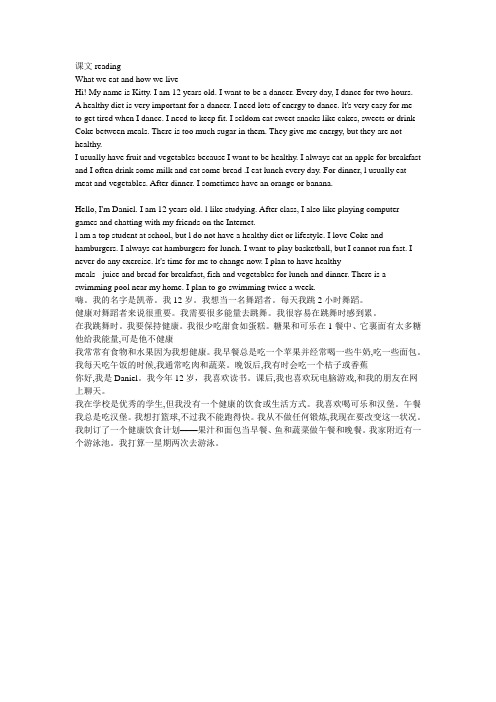
课文readingWhat we eat and how we liveHi! My name is Kitty. I am 12 years old. I want to be a dancer. Every day, I dance for two hours.A healthy diet is very important for a dancer. I need lots of energy to dance. lt's very easy for meto get tired when I dance. I need to keep fit. I seldom eat sweet snacks like cakes, sweets or drink Coke between meals. There is too much sugar in them. They give me energy, but they are not healthy.I usually have fruit and vegetables because I want to be healthy. I always eat an apple for breakfast and I often drink some milk and eat some bread .I eat lunch every day. For dinner, l usually eat meat and vegetables. After dinner. I sometimes have an orange or banana.Hello, I'm Daniel. I am 12 years old. l like studying. After class, I also like playing computer games and chatting with my friends on the Internet.l am a top student at school, but l do not have a healthy diet or lifestyle. I love Coke and hamburgers. I always eat hamburgers for lunch. I want to play basketball, but I cannot run fast. I never do any exercise. lt's time for me to change now. I plan to have healthymeals - juice and bread for breakfast, fish and vegetables for lunch and dinner. There is a swimming pool near my home. I plan to go swimming twice a week.嗨。
译林牛津版7A Unit 4 Food language points

译林牛津版7A Unit 4 Food language points1. It’s lunchtime.是吃午饭时间了。
写出2种同义句:1)______ _____ ______ ______ . 2) _____ ____ ______ ________ ______ .2. need 需要,need sth to do sth 需要……做某事,need sth 需要某物;need to do sth. 需要做某事。
Eg. 1)他需要3枝铅笔。
He ____ three _____ . 2) 你需要练习多说英语。
Y ou ____ _____ _____ _____ English _____ .3) 我需要许多能量来跳舞。
I _____ _____ ______ ______ ______ ________ .3. I walk to my bowl many times a day. 我每天都往我的饭碗那儿走好多次。
1)walk to my bowl = go to my bowl on foot 走向我的碗。
类似的表达:步行回家_____ ______ = ____ _____ _____ _____; 在周末她乘公交车回家。
She _____ _____ ____ _____ ______weekends . = She _____ _____ ___ _____ _____ weekends. 2)time作“时间”讲,是不可数名词,这里意思是“次数”,是可数名词。
Eg. 她有许多时间和她的朋友们谈话。
She ____ ______ _____ ____ ____ ______ ______ her friends. 我一周去图书馆许多次。
I ____ _____ _____ _____ ____ _____ ______ _______ .4. why = what for 为什么,eg. 你为什么上学?____ ____ do you ____ ____ _____ ? = ____ do you _____ _____ ______ ?5.Y ou never exercise. 你从不锻炼。
译林版牛津英语7AUnit4单元知识点总结+测试卷(附答案)

译林版牛津英语7AUnit4单元知识点总结+测试卷(附答案)7A Unit 4 My day单元重点知识点总览1. need to do sthneed doing2.It?s time for sth.It?s time to do sthIt?s time for sb to do sth.3.go to sleep 入睡go to bed 去睡觉4.I don?t know how to have fun 不知道怎样娱乐“疑问词+动词不定式”结构常跟在know,tell, teach 等动词之后作宾语5.have fun =have a good time=enjoy oneself 玩得开心6.exercise 操练,练习(可数名词,常用复数)exercise 锻炼(不可数名词)7.practise doing sth 练习做某事8.be nice to sb =be good to sb 对某人友好9.chat with sb 与某人聊天chat with each otherhelp each otherlearn from each other10.Children?s Day ;Teachers? Day ;Fools? Day ;Women?s Day ;Mother?s/Father?s Day11.would like to do sthwant to do sth12.have (much) time to do sth 有时间做某事a long time 很长时间all the time 一直at the same time 同时in time 及时on time 准时from time to time 有时13.dancing /swimming/singing/reading lessons14.good luck with sth 祝在某方面好运good luck to sb 祝某人好远15.have a picnic=go for a picnic 去野餐16.between 和among的区别between .....and ......between +名词的复数17.How often /how soon/how long/how far的区别18.the reason for (doing)sth19.learn from sb 向某人学习learn to do sth 学做某事learn about 了解,获悉20.in the world 在世界上all over the world 全世界travel around the world 环游世界21.be good for 对.....有好处反义be bad forbe good to 对.... 友好be good at 擅长22.too much/too many/much too的区别23.put up 张贴;举起;提出(建议)put down 写下put on 穿上;上映put away 把....收起来put out 扑灭put off 推迟24.want sb (not) to do sth. 想要某人(不)做某事语法1.时间介词:in/at/on2.频度副词的用法:never,seldom,sometimes,often,usually,always单元重点短语归纳1.wake up 醒来2.go out 出去;熄灭3.how to have fun 如何得到乐趣4.do morning exercises 做早操5.do after-school activities 做课外活动6.be late for 迟到7.be nice to sb对某人很好8.chat with each other相互聊天9.best wishes 最好的祝福10.at age 6 在6岁时11.once a year 一年一次12.plant trees 植树13.a member of ......的成员14.have a good time 玩得开心15.be good for 对.....有好处句型归纳1.My favourite lesson is English. 我最喜欢的课是英语2.We practise after school on Wednesday afternoon. 我们在周三下午放学后练习3.Amy is a member of the swimming team. Amy是游泳队的一员4.They have lots of fun on Children?s Day. 他们在儿童节玩得很开心5.I can learn a lot about the world . 我能学到很多关于世界方面的知识7A Unit4单元测试(A)卷一.短语翻译(每题1分,共10分)1.玩得愉快2.做早操3.在八点一刻4.在操场上5.一切顺利6. at work7.be good for 8.a member of9.write to sb. 10.start lessons二.单项选择(每题1分,共15分)( ) 1. The teacher says we shouldn?t read comic booksA. much tooB. too muchC. many tooD. too many ( ) 2. his father, David Beckham playing football.A. Like,; likesB. Likes; likeC. Like; likeD. Likes; likes ( ) 3. We have to do every day.A. lots of homeworkB.lots of homeworksC. lot of homeworkD. a lots of homeworks( ) 4. Her parents from Shanghai.A. are allB. all areC. both allD. are both ( ) 5.----Open the door please.I?m home.----Come in,please.The door .A. opensB. is openingC. is openD. opened ( ) 6. My bike is broken. Can I a bike you?A. borrow; toB. borrow; fromC. lend; fromD. lend; to ( ) 7. Please have breakfast in morning. It?s good for you.A. the, aB. a, theC. /, /D. /, the ( ) 8. are in Class 12, Grade 7. in the same classA. Jimmy, I and you; We?reB. I, you and Jimmy; They?reC. Jimmy, you and I; They?reD. you, Jimmy and I; We?re( ) 9. I hope the volleyball match. I our team good luck.A. us to win, wishB. we will win, wishC. we to win, hopeD.we will win, hope( ) 10.------Do you every day?------Yes, good for our eyes.A. do eye exercise, it?sB. do eye exercises, they?reC. do eyes exercise, it?sD. do eyes exercises, they?re ( ) 11.Danie?s grandmother is very old. She can?t him well.A. listenB. listen toC. hearD. hear to ( ) 12. I?m going to Nanjing Monday morning.A. atB. inC. onD. of( ) 13. Lily playing football because she is not good at it.A. likeB. lovesC. dislikeD. dislikes ( ) 14. They always do activities .A. after-school; after schoolB. after-school; after-schoolC. after school; after schoolD. after school; after-school( ) 15.I like to TV, but my father likes to books.A. watch; readB. watch; lookC.watch; seeD. read; look at 三.完型填空(每题1分,共10分)Dear Annie,Thank you 1 your letter. I?m glad you like your school.I go to school from Monday 2 Friday. We 3 four classes in the morning and two classes in the afternoon. We have many things4 after class. On Monday and Wednesday afternoon we have5 .On Tuesday afternoon some of6 have a7 class and onThursday afternoon some have a drawing class. On Friday afternoon, we practice 8 English. My Chinese friends would like 9 with me in English. They think I am like an English teacher. Isn?t it great?On Saturdays and Sundays I 10 go to school. Very often I go to the parks and have a good time with my family there.Yours,Henry ( ) 1.A.to B.of C.for D.with( ) 2.A.to B.on C.for D.with( ) 3.A.has B.having C.have D.had( ) 4.A.doing B.does C.do D.to do( ) 5.A.sport B.sports C.some sport D.a sport ( ) 6.A.we /doc/51e483be7e21af45b207a87f.html C.them D.they( ) 7.A.sing B.sings C.singing D.sang( ) 8.A.speak B.to speak C.speaks D.speaking ( ) 9.A.to talk B.talk C.talks D.talking ( )10.A.don?t B.doesn?t C.not D.can?t四.阅读理解(每题2分,共30分)AMr Smith is a teacher of English. He comes from America. He teaches English in China. He speaks Chinese quite well.He reads a lot of books and his wife often writes books for the students at home. Mr Smith gets up at five in the morning. He leaves home at ten to six. He begins the first lesson at 8:00. He teaches English every day except Saturday and Sunday. At ten to twelve he finishes his lessons. Ten minutes later he has lunch. In the afternoon, he often plays games with his students. Sometimes he teaches his students in his office. Supper time is at about six. After that, he reads newspapers and watches TV. At about ten to eleven he goes to bed.( ) 1. Mr.Smith is .A.a ChineseB.an EnglishmanC.a workerD.an American ( ) 2. He leaves home at .A.6:10B.5:50C.7:10D.6:50( ) 3. He doesn't have any English classes on .A.SaturdayB.SundayC.FridayD.Saturday and Sunday( ) 4. He has lunch at .A.12:30B.12:00C.13:30D.13:00( ) 5. He watches TV or reads newspaper supper.A.beforeB.afterC.atD.inBMay 10th is Meg?s birthday. She gets a gift. It is a new coat from her sister. The coat is very beautiful and she feels very happy.One day,Meg finds that a button(纽扣)of her coat is lost. She looks for the button everywhere,but she can’t find it.The next day,she doesn?t wear that coat to school and feel sad all day.After school, she goes to the clothes shops and wants to buy that kind of clothes.But she feels disappointed.Meg tells her sister about that,her sister says,“We can change all the buttons.Then the buttons will be the same.”The coat is beautiful again and Meg feels happy again. ( ) 6.Meg?s sister buys for her on her birthday.A.some buttonsB.a new coatB.C.a new bike D.some flowers( ) 7.How does Meg feel when she doesn?t wear that coat?A.She feels happy.B.She feels bored.C.She feels excited.D.She feels sad.( ) 8.What does Meg?s sister do at the end of the story?A.She changes all the buttons of the coat.B.She buys another coat again.C.She buys a button in the clothes store.D.She goes to the clothes store and changes the coat.( ) 9.What does the underline word “disappointed” mean in Chinese?A.兴奋的B.失望的C.难过的D.高兴的( ) 10.What?s the best title for the passage?A.A lost buttonB.A lost coatC.A kind sisterD.A clothes storeCMy daughter Eyen is ten years old. She is in Grade Three in a primary school. She is a cute girl though she has some strange ideas sometimes.One day she asks me, “Mum, what is your favorite subject?”I think for a while and answer, “ It is difficult to tell. I love singing, so music is my favorite. And I am good at English. My history teacher also s ays I am excellent. Well, I can say I don?t like Science. But Science is important for us, you know. So you must do well in it. What is your favorite subject, Eyen? Tell me something about your subjects, dear.”I like Chinese. It is easy. I like English because my English teacher likes me very much. I can?t stand Maths. It is serious and sad.”“Do you mean your Maths teacher is serious and sad?”“No, it is Maths, not the Maths teacher.”“Why do you think so?”“Because Maths has so many problems! Isn?t it sad all day?”( ) 11. Eyen is ______ years old. She is a ________.A. ten; middle school studentB. nine; middle school studentC. nine; primary school studentD. ten; primary school student( ) 12. The mother doesn?t like ______ thoug h it is important.A.musicB. MathsC. EnglishD. Science ( ) 13. The girl thinks _____ is serious and sad.A.Her Maths teacherB. MathsC. her Chinese teacherD. Chinese ( ) 14. Why doesn?t the girl like Maths?A.Because it is too easyB. Because it is difficult to learnC.Because there aren?t many problems in it.D. Because her teacher doesn?t like her at al l.( ) 15.Which subject does Eyen like?A.Chinese and MathsB. Chinese and EnglishC. English and MathsD.music and English五.任务型阅读(每题1分,共10分)Hi! I am Mike. I have a sister and two brothers. We live in a happy family. Nancy is my sister. She is the oldest. She is a kind girl. She is beautiful. She likes learning. She studies very hard. She gets up early and finishes hr breakfast quickly. Then she goes to school by bike. David is my brother. He is older than me. But he is a little lazy. He gets up late and then washes his face, brushes his teeth in a hurry. Then he goes to the bus stop without breakfast. He usually plays basketball after school. In the evening, he seldom does homework. He goes to bed late. Jack is our little brother. He is a lovely boy. He gets up very slowly and then he usually takes a shower before breakfast. He goes to school in his father?s car. He likes watching TV in the evening.Name Nancy David Jack Personality(个性) She is 1 . He is a little lazy. He is 2 .How to go to school?She 3 to school. He goes to school by4 .He takes a 5 toschool.Habit She finishes herbreakfast 6 He 7 have breakfast. He usually takes ashower 8 breakfast.9 She likes studying. He likes playing10 . He likes watching TV.1.__________2.__________3.__________4._________5.__________6.__________7.__________8.__________9.__________ 10.__________ 六.用所给单词适当形式填空(每题1分,共15分)1.Yao Ming and Lin Shuhao are both basketball (play).2.What about (go) on a picnic next Sunday?3.He enjoys (listen) to music.4.I have many different (kind) of books.5.This is our (one) English lesson.6.We have lots of (activity) after school every day.7.Some children don?t know how (have) fun.8.My mother goes to the supermarket (two) a week.9.Please tell me about your (like) and dislikes.10.Thank you for (buy) me a new pen.11.Let?s help Jack (do) Chinese exercise.12.We should practice (speak) English more.13.Sometimes Jim with his parents (eat) dinner at Shanghai Restaurant.14.Which do you like (good), apples, oranges or pears?15.Lucy, (wake) up, it?s too late.七.首字母填空(每题1分,共10分)Today more and more students are getting shorter sleeping time.Most students sleeps for fewer than(少于) eight h 1 every night, as(因为) they have m 2 homework to do. Some homework is given by the school teachers, and some is from their p 3 . Also, some students don?t know how to save(节约) the t 4 . They aren?t careful enough when they are d 5 their homework, so it t 6 them lots of time. Some students have to get up e 7 to read English in the morning. Some want to get to school on time, b 8 their homes are far away from the school.We hope t 9 and parents should cut down(减少) on the homework, so that children can have more free time to e 10 their childhood(童年).7A Unit4单元测试(A)卷参考答案一.短语翻译(每题1分,共10分)1.have fun2.do morning exercises3.at a quarter past eight4.in the playground5.all the best6.在上班7. 对........有好处8..........的一员9.给某人写信10.开始上课二.单项选择(每题1分,共15分)1-5DAADC 6-10BDDBB 11-15CCDAA三.完型填空(每题1分,共10分)1-5 CACDB 6-10 BCDAA四.阅读理解(每题2分,共30分)1-5 DBDBB 6-10 BDABA 11-15 DDBBB五.任务型阅读(每题1分,共10分)1.kind2.lovely3.rides4.bus5.car6.quickly7.doesn?t8.before9.Hobbies 10.basketball六.所给词适当形式填空(每题1分,共15分)1.players2.going3.listening4.kinds5.first6.activities7.to have8.twice9.likes 10.buying11.do 12.speaking 13.eats 14.best 15.wake 七.首字母填空(每题1分,共10分)1.hours2.much3.parents4.time5.doing6.takes7.early8.but9.teachers 10.enjoy7A Unit4单元测试(B)卷一、短语翻译(每题1分,共10分)1.have fun __________________2.做课外活动____________3.at a quarter past nine ________4.做早操________________5.chat with each other __________6. be late for school ________7.tell you about my life __________ 8. 在校足球队____________9.once a month _______________ 10.从周一到周五_________二、单项选择(每题1分,共15分)( )1.(2014襄阳)-_____does your father allow you to surf the Internet?- Only once a week.A. How farB.How longC.How oftenD.How much ( )2.(2014河南)-Where shall we eat tonight?- Let?s call Harry.He ___ knows the best places to go .A.onlyB. nearlyC.seldomD.always( )3.(2014抚顺)- We?ll have a school trip to Fuzh ou City Museum next week.- ____.And I?m sure you?ll learn a lot.A.Have funB. Cheer upC. Best wishesD. Never mind ( )4.(2013孝感)-Why are you so tired these days?-Well, I have _____ homework to do.A.too muchB.too manyC.much tooD.many too( )5.(2013重庆)-_____ does your father play tennis after work?- Every Tuesday and Thursday.A.How oftenB.How soonC. WhereD. Why( )6.(2013上海) Wow! Ten students in our class will celebrate their fourteenth birthdays _____ October!A.onB.inC.atD.to( )7.(2013北京)Lucy lived in Beijing from 2008 ____ 2012.A.onB.atC.toD.of( )8.(2013菏泽)The World Health Organization has given some advice on ____to protect us from being infected(感染)with H7N9.A.whereB.whatC.howD.when( )9.(2013北京)-Which do you prefer, tea _____coffee?-Tea,please.A.butB.orC.soD.and( )10.(2014济南)-Would you like ____ Emily and Carol?-Of course. I hear they are twins and play the piano well .A.metB.meetsC.to meetD.meet( )11.We can see a playground _____ the two tall buildings.A.betweenB.amongC.inD./( )12.Peter and I______ students. We _____ reading newspapers.A.are both,both likeB.are both,like bothC.both are,both likeD.both are,like both( )13.I often ____ from school with my friend Millie.A.go back to homeB.goes back homeC.goes back to homeD.go back home( )14.-How long do you spend _____ homework every day? - Twenty minutes.A.doB.to doC.doingD.does( )15.-Who ____ in the morning every day?- Nobody.A.wake you upB.wake up youC.wakes you upD.wakes up you三、完形填空(每题1分,共10分)The Spring Festival is the Chinese__1___. It usually comes in January or February. Everyone in China_2___ the Spring Festival very much. When the Spring Festival _3____, Simon usually helps his parents____4___ their house and do some shopping and other__5____. ___6__ that day, everyone in China eats dumplings, New Year?s cakes and some_7____ delicious food. Simon likes New Year?s cakes, but Sandy says dumplings are __8____ than New Year?s cakes. The Chinese people eat New Year?s cakes and dumplings __9___ their houses.__10___ happy they are!( ) 1. A. New Year?s Day B. Teachers? DayC. Children?s DayD. Mid-autumn Day( ) 2. A. thanks B. calls C. looks D. likes( ) 3. A. goes B. comes C. takes D. celebrates ( ) 4. A. want B. get C. come D. clean ( ) 5. A. housework B. families C. homework D. shopping ( ) 6. A. In B. At C. On D. For( ) 7. A. another B. other C. others D. the other ( ) 8. A. tired B. better C. nice D. the nicest ( ) 9. A. in B. at C. with D. outside ( ) 10.A. WhatB. What aC. How aD. How四、阅读理解(每题2分,共30分)ALisa goes to school on foot every day. One morning, Lisa leaves home after breakfast without an umbrella. Then it begins to rain. The rain becomes heavier and he avier. Lisa?s mother worries about her daughter and decides to find Lisa to give her an umbrella. She drives along the way her daughter always walks. She looks left and right through the car windows to look for Lisa. Finally, she finds Lisa walking in the street happily. She also finds that every time lightning strikes, Lisa will stop, look up at the sky and smile. Lisa?s mother is very surprised. She shouts to Lisa, “Lisa, what are you doing?” She answers, “God is taking photos of me, so I smile!”( ) 1. How is the weather according to the passage?A. HotB. WarmC. RainyD. Cold( ) 2. Does Lisa go to school with an umbrella?A. Yes, she is.B. No, she isn?tC. Yes, she doesD. No, she doesn?t ( ) 3. How does Lisa?s mother go to send Lisa an umbrella?A.On footB. By bikeC. By carD. By bus( ) 4. Which is Not true according to the passage?A. Lisa is afraid of the lightning.B. Lisa enjoys the rainingC..Lisa is lovely.D..Lisa?s mother cares for her daughter.( ) 5. Which is the best title for the passage?A bad day B. An umbrella C. Smile D. A great motherBOn Christmas Eve, the night before Christmas Day, children are very happy. They put their stockings at the end of their beds before they go to bed. They want Father Christmas to give some presents. Father Christmas is a very kind man. He comes on Christmas Eve. He lands on top of each house and comes down the chimney into the fireplace and brings children a lot of presents.Christmas Day always begins before breakfast. Children wake up very early. They can?t wait to open the presents in their stockings. Then they wake up their parents and shou t … Merry Christmas!?Do you know what Christmas means? Christmas Day is the birthday of Jesus Christ. When Christ was born, many people gave him presents. So today, people still do the same thing to the children.( ) 6. Christmas Eve is__________.A. the night before 24 DecemberB. the night after 25 DecemberC. the night of 24 DecemberD. the night of 25 December( ) 7. Father Christmas often puts the presents________.A. into children?s hatsB. into children?s stockingsC. under children?s bedsD. into children?s shoes( ) 8. Father Christmas comes into the house through the_______.A. windowB. front doorC. chimneyD. back door( ) 9. On the morning of Christmas Day, children say?_____? to their parents.A. Good morningB. Happy New YearC. Best Wishes to youD. Merry Christmas( ) 10. On Christmas Day, what do people often do to children?A.Give presentsB. Ask for moneyC. ask for presentsD. Give noneCJohn is a middle school student. He is sixteen years old now. One day he had a terrible cold and a fever. He felt bad and couldn't eat anything. So he went to see a doctor. The doctor gave him a bottle of medicine. These are the words on the bottle of the medicine.Cold medicineYou must shake(摇晃) it before you take it. Take it three times a day after meals. Dose (剂量):Age: over 15 2 teaspoons(茶匙) a day8-14 1 teaspoon a day5-7 1/2 teaspoon a dayThe children under 4 years old can't take this medicine.。
新牛津英语译林版7A各单元词汇及重点句型一览表

新牛津英语译林版7A各单元词汇及重点句型一览表Unit1 This is me.单词:1 oh /əʊ/ excl. 哦,啊2 e—dog /'i:dɒɡ/ n. 电子狗3 master /'mɑ:stə(r)/ n。
主人4 grade /ɡreɪd/ n. 年级5 student /ˈstju:dnt/n. 学生6 reading /’ri:dɪŋ/n。
阅读7 classmate /ˈklɑ:smeɪt/ n. 同班同学8 afterschool /ˈɑ:ftə sku:l/ 放学后9 slim /slɪm/ adj. 苗条的10 be good at /bi: ɡud æt/ 擅长于11 over there /’əʊvə(r) / /ðεə/ 在那边12 classroom /ˈklɑ:sru:m/ n。
教室13 dancing /'dɑ:nsɪŋ/n。
跳舞,舞蹈14 swimming /ˈswɪmɪŋ/n. 游泳15 age /eɪdʒ/ n。
年龄16 looks /lʊks/ n。
相貌,容貌17 cute /kju:t/ adj. 可爱的;讨人喜欢的18 hobby /'hɒbɪ/ n。
业余爱好19 glad /ɡlæd/ adj. 高兴地20 everyone /ˈevriwʌn/ pron.每人,人人21 comefrom /kʌm frɔm/ 来自22 glasses /’glɑ:sɪz/ n. 【复】眼镜句型:1.How to look after your e-dog.如何照顾你的电子狗。
2.I have short hair。
= My hair is short.我短发。
3.Let's meet my new classmates.让我们见见我的新同学。
4.She is tall and slim。
她高而苗条。
译林牛津版新教材资源重点短语和句子--7A Unit4

译林牛津版新教材资源重点短语和句子--7A Unit41.wake up 醒来2.wake me up 把我叫醒3.go walking 去散步4.watch too much TV 看太多的电视5.be late for school 上学迟到6.start lessons 开始上课7.do after-school activities 做课外活动8.It’s time for sth /to do sth该干某事了9.I’m never late for school. 我上学从来不迟到10.I don’t know how t o have fun. 我不知道怎样享乐11.need a good rest 需要好好休息12.have lessons/have classes 上课13.have too much homework 有太多的作业14.learn a lot about the world 多了解世界15.dislike doing 不喜欢做某事16.do morning exercises 做早操17.do eye exercises 做眼保健操18.do / take (some) exercise 做运动,做锻炼(不可数) 19.do an English exercise 做一个英语练习(可数)20.be nice to sb = be friendly to sb 对某人友好21.chat with each other 互相聊天22.at a quarter past eight 在八点一刻23.on Wednesday afternoon 在周三下午24.best wishes 最美好的祝愿25.practice playing volleyball 训练打排球26.from to 从...到…27.get ready for the day 为一天做好准备28.plant trees 植树29.in January/February/March/April/May/June/July/August/September/October/November/December在月份30.in the morning/after/evening 在上午、下午、晚上31.on the morning/after/evening of ………在某一个上午、下午、晚上32.help us do sth. / help sb. to do sth. 帮助某人做某事33.on a cold night 在一个寒冷的夜晚34.on the night of July 1st 在七月一日的夜晚35.at noon/night 在中午\夜晚36.on Saturday 在周六37.on Children’s Day在儿童节38.in Spring/Summer/Autumn/Winter 在春天39.in 1999 在1999年40.at 6 years old = at 6 在6岁的时候41.have lots of fun (doing) 玩得很开心42.thanks for your emails 谢谢你的电子邮件43.have a football match 举行一场比赛44.tell sb about sth. 告诉你关于我的生活45.have much time to do 有许多时间做某事46.go to dancing lessons 去上舞蹈课47.go roller skating 去溜旱冰48.get there/home 到那、到家49.once a week 每周一次50.between A and B 在……和……之间51.hope to do sth. 希望做某事52.hope + (that) 跟that宾语从句(从句中含will或can)希望某人做某事53.wish our team good luck 祝我们的球队好运54.wish sb good luck 祝某人好运55.good luck to sb with sth 做某人某事好运56.visit the museum 参观博物馆57.twice a month 一个月两次58.go on a picnic 去野炊59.be good for us 对某人有益60.too much (修饰不可数) / too many(修饰可数)太多1、。
牛津译林版英语7AUnit4Reading(II)教学设计
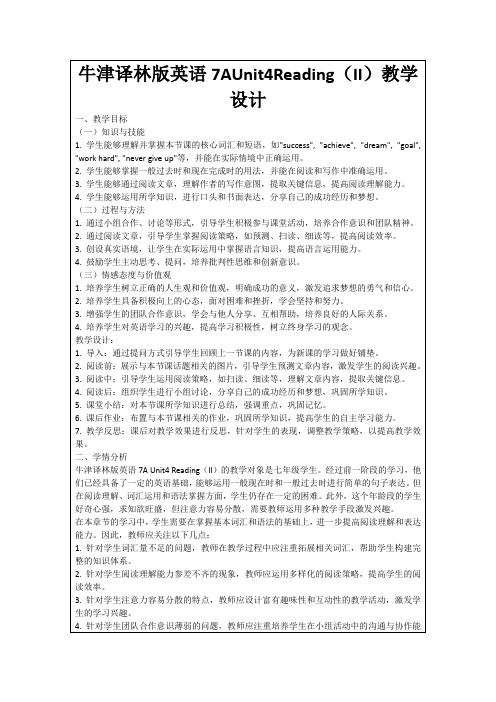
1.针对学生词汇量不足的问题,教师在教学过程中应注重拓展相关词汇,帮助学生构建完整的知识体系。
2.针对学生阅读理解能力参差不齐的现象,教师应运用多样化的阅读策略,提高学生的阅读效率。
3.针对学生注意力容易分散的特点,教师应设计富有趣味性和互动性的教学活动,激发学生的学习兴趣。
3.学生能够通过阅读文章,理解作者的写作意图,提取关键信息,提高阅读理解能力。
4.学生能够运用所学知识,进行口头和书面表达,分享自己的成功经历和梦想。
(二)过程与方法
1.通过小组合作、讨论等形式,引导学生积极参与课堂活动,培养合作意识和团队精神。
2.通过阅读文章,引导学生掌握阅读策略,如预测、扫读、细读等,提高阅读效率。
五、作业布置
为了巩固本章节的学习内容,确保学生对核心知识点的掌握,特布置以下作业:
1.写作练习:请学生撰写一篇关于自己梦想的短文,要求运用本节课学习的词汇和语法,如"success", "achieve", "dream", "goal", "work hard", "never give up"以及一般过去时和现在完成时。通过写作,让学生将理论知识与个人经历相结合,提高语言运用能力。
2. Can you share a successful experience of your own?
3. What is your dream and how do you plan to achieve it?
这些问题将自然引出本节课的主题,为学生接下来的学习做好情感上的准备。
牛津译林版英语7AUnit4Reading(I)教学设计

2.重点:培养学生寻找文章主旨、细节和推理等阅读策略。
难点:在实际情境中灵活运用这些阅读策略,提高阅读效率。
3.重点:了解不同节日的文化背景和庆祝方式,培养学生的跨文化交际意识。
难点:将所学文化知识内化为自身的认知,并在实际交流中予以运用。
4.丰富教学手段,提高学习效果:运用多媒体教学资源,如图片、视频、音频等,帮助学生更好地理解和记忆课文内容。
5.强化阅读策略训练:在教学过程中,教师要有意识地引导学生运用阅读策略,如预测、扫描、略读等,提高阅读效率。
6.文化渗透,拓展视野:通过课文学习,引导学生了解不同节日的文化背景,培养跨文化交际意识。同时,结合我国传统文化,让学生在学习过程中弘扬民族精神。
3.教师选取部分学生的作业进行展示和讲评,指出其中的优点和不足。
4.学生根据教师的反馈,进行自我修正,提高英语运用能力。
(五)总结归纳(500字)
1.教师引导学生回顾本节课所学内容,总结一般现在时描述节日庆祝活动的用法。
2.学生分享自己在课堂学习中的收获和感受,教师给予鼓励和肯定。
3.教师强调文化差异的重要性,提醒学生在实际交流中尊重和理解不同文化背景的人。
b.梳理下一节课的重点词汇和句型,为课堂学习做好准备。
教师将根据学生的作业完成情况,给予评价和反馈,鼓励学生持续进步。通过完成这些作业,学生将更好地掌握节日相关知识,提高英语综合运用能力,增强跨文化交际意识。
2.学生能够理解并运用一般现在时描述不同节日的庆祝活动及其特点。
3.学生通过阅读,提高阅读速度和理解能力,掌握寻找文章主旨、细节和推理等阅读策略。
4.学生能够运用所学知识,进行口头和书面表达,介绍自己了解的节日及其庆祝方式。
译林牛津英语7A Unit 4【单元测试卷】(附答案)

译林牛津英语7A Unit 4【单元测试卷】(附答案)一.短语翻译(每题1分,共10分)1。
玩得愉快2。
做早操3.在八点一刻4.在操场上5。
一切顺利 6. at work7.be good for 8。
a member of9.write to sb. 10.start lessons二.单项选择(每题1分,共15分)() 1. The teacher says we shouldn’t read comic booksA. much tooB. too much C。
many too D。
too many () 2. his father, David Beckham playing football。
A. Like,; likes B。
Likes; like C. Like; like D。
Likes; likes()3。
We have to do every day.A. lots of homeworkB.lots of homeworksC. lot of homeworkD. a lots of homeworks( ) 4。
Her parents from Shanghai.A。
are all B。
all are C. both all D。
are both() 5.—--—Open the door please。
I’m home。
——--Come in,please。
The door 。
A。
opens B. is opening C。
is open D。
opened ()6。
My bike is broken。
Can I a bike you?A. borrow; to B。
borrow; from C。
lend; from D. lend;to() 7. Please have breakfast in morning。
It’s good for you.A. the, a B。
牛津译林版英语7A Unit4 My day知识点归纳

牛津译林版英语7A Unit4 My day知识点归纳XXX.你现在开始做作业吧。
(及物动词)I XXX.我昨天开始读一本新书。
(动名词作宾语)I started to learn English when I was six years old.我六岁时开始学英语。
(动词不定式作宾语)语法点拨】一般现在时的用法1.表示经常性的动作或状态。
I usually get up at six o’clock.我通常六点钟起床。
2.表示客观真理。
XXX moves around the sun.地球绕太阳转。
3.表示现在的状态或情况。
I am a student.我是一名学生。
4.表示将来。
XXX.明天早上六点火车开。
5.表示命令、建议、邀请等。
Don’t smoke in the office.办公室里不准吸烟。
Let’s have a walk after supper.晚饭后我们去散步吧。
6.表示评论、描写、说明等。
This book tells us a lot about Chinese history.这本书向我们讲述了很多中国历史。
写作指导】本文主要介绍了一些常用的词汇及语法点,如动词的用法、时态等。
在写作中,要注意正确使用这些词汇和语法点,以使文章表达准确、流畅。
同时,也要注意文章的格式,如段落的分隔等。
We learn English in school。
It's never too late to learn。
Common phrases with "learn" include "learn about" and "learn from." "Learn" emphasizes the act of learning and acquiringknowledge。
while "learn about" emphasizes gaining n and understanding.Just learning about English doesn't mean you've learned the language。
Unit4知识点整理牛津译林版七年级英语上册
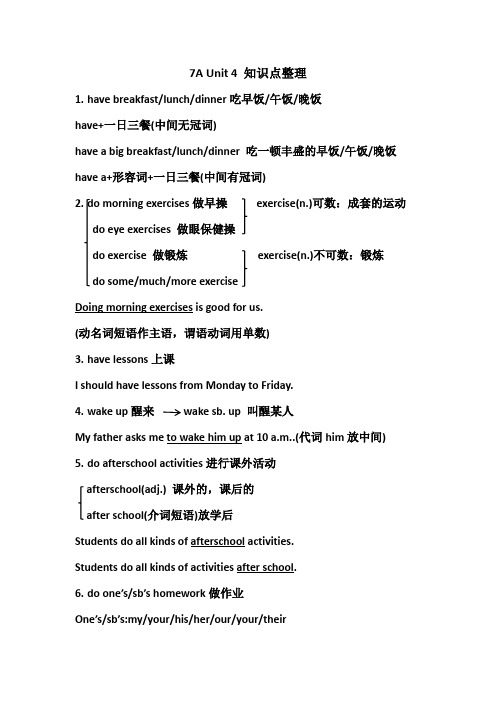
7A Unit 4 知识点整理1.have breakfast/lunch/dinner吃早饭/午饭/晚饭have+一日三餐(中间无冠词)have a big breakfast/lunch/dinner 吃一顿丰盛的早饭/午饭/晚饭have a+形容词+一日三餐(中间有冠词)2.do morning exercises做早操exercise(n.)可数:成套的运动do eye exercises 做眼保健操do exercise 做锻炼exercise(n.)不可数:锻炼do some/much/more exerciseDoing morning exercises is good for us.(动名词短语作主语,谓语动词用单数)3.have lessons上课I should have lessons from Monday to Friday.4.wake up醒来wake sb. up 叫醒某人My father asks me to wake him up at 10 a.m..(代词him放中间) 5.do afterschool activities进行课外活动afterschool(adj.) 课外的,课后的after school(介词短语)放学后Students do all kinds of afterschool activities.Students do all kinds of activities after school.6.do one’s/sb’s homework做作业One’s/sb’s:my/your/his/her/our/your/their肯定句:She often does her homework in time.疑问句:Does she do her homework in time?否定句:She doesn’t do her homework in time.7.go to bed去睡觉Young people often go to bed late.8.be late for迟到Don’t be late for school tomorrow.(Don’t do sth.祈使句否定) 9.at a quarter past eight 在8:15(past几点过了几分)at 8:30/at 6 years old/at Christmas/at noon/at night/at lunch (at+时刻/年龄/不以Day结尾的节日/固定搭配)10.It is time for sth.=It is time to do sth.到了做...的时间It is time for dinner.=It is time to have dinner.It is time for sb. to do sth. 对于某人来说到了做...的时间It is time for us to do more exercise.11.Shall we do sth.? 让我们做...可以吗?Let’s do sth., shall we? 让我们做...可以吗?What/How about doing sth.? 做...怎么样?提出建议Why not do sth.? 为什么不做...呢?Why don’t you do sth.? 为什么不做...呢?12.go walking去散步go running/swimming/shopping/fishing: go+Ving去做某事13.go out出去Eddie is lazy, so he seldom goes out.14.need a good rest=need to have a good rest需要好好休息need sth./need to do sth. 需要.../需要做......After doing some afterschool activities, I need a good rest.After doing some afterschool activities, I need to have a good rest.15.how to have fun如何玩乐(特殊疑问词+to do sth.)Some dogs just don’t know how to have fun.16.have (lots of/great) funhave a good/great/wonderful time 玩得开心enjoy oneself(myself/yourself/himself/herself/...)have fun doing=have a good time doing做...很开心They have fun watching basketball matches on TV.They have a good time watching basketball matches on TV.17.start/begin to do sth. 开始做某事We start/begin to have lessons at eight in the morning.18.from Monday to Friday 从周一到周五19.do morning exercises first 先做早操20.my favourite subject 我最喜爱的科目21.chat with each other(chatchatting) 彼此聊天Girls enjoy chatting with each other after class.22.in the morning/afternoon/evening 在早上/下午/晚上in the morning/in 2022/ in October/in autumn(in+一天的早中晚/年份/月份/季节)23.have a Reading Club 有一个阅读俱乐部24.on Thursday afternoon 在周四下午on Sunday/on October 1/ on the morning of October 1/ on a cold winter morning/on Children’s Day(on+星期/日期/具体某一天的早中晚/以Day结尾的节日)25.be in the school volleyball team 在学校的排球队=be a member of the school volleyball teamSimon is in the school volleyball team.=Simon is a member of the school volleyball team.26.practise doing sth. 练习做某事Millie and Sandy like practising playing volleyball after school.27.have much time to do sth. 有许多时间做某事have time to do sth. 有时间做某事have enough time to do sth. 有足够的时间做某事have little time to do sth. 几乎没有时间做某事have no time to do sth. 没有时间做某事28.go to her dancing lessons 去上舞蹈课29.dance for half an hour 跳舞半小时(for+一段时间)30.go roller skating 去溜旱冰31.Wish our team good luck. 祝我们的队好运。
苏教版(牛津译林)初中英语 初一上册 7A Unit 4 知识点总结
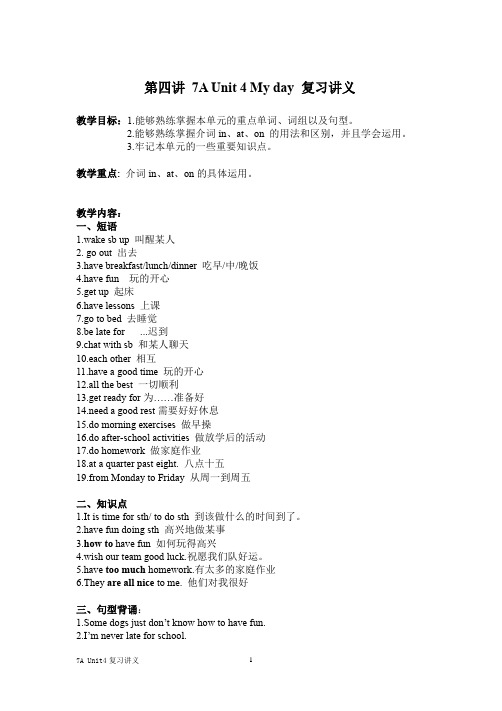
第四讲7A Unit 4 My day 复习讲义教学目标:1.能够熟练掌握本单元的重点单词、词组以及句型。
2.能够熟练掌握介词in、at、on 的用法和区别,并且学会运用。
3.牢记本单元的一些重要知识点。
教学重点: 介词in、at、on的具体运用。
教学内容:一、短语1.wake sb up 叫醒某人2. go out 出去3.have breakfast/lunch/dinner 吃早/中/晚饭4.have fun 玩的开心5.get up 起床6.have lessons 上课7.go to bed 去睡觉8.be late for ...迟到9.chat with sb 和某人聊天10.each other 相互11.have a good time 玩的开心12.all the best 一切顺利13.get ready for为……准备好14.need a good rest需要好好休息15.do morning exercises 做早操16.do after-school activities 做放学后的活动17.do homework 做家庭作业18.at a quarter past eight. 八点十五19.from Monday to Friday 从周一到周五二、知识点1.It is time for sth/ to do sth 到该做什么的时间到了。
2.have fun doing sth 高兴地做某事3.how to have fun 如何玩得高兴4.wish our team good luck.祝愿我们队好运。
5.have too much homework.有太多的家庭作业6.They are all nice to me. 他们对我很好三、句型背诵:1.Some dogs just don’t know how to have fun.2.I’m never late for school.3.After class, we often chat with each other or play in the playground.下课后,我们经常在一起聊天或者在操场上玩4.We practice after school on Wednesday afternoon.周三下午放学后我们一起训练5.Best wishes 美好的祝愿6.I like to go on picnics with my family.我喜欢跟我的家人聚餐。
- 1、下载文档前请自行甄别文档内容的完整性,平台不提供额外的编辑、内容补充、找答案等附加服务。
- 2、"仅部分预览"的文档,不可在线预览部分如存在完整性等问题,可反馈申请退款(可完整预览的文档不适用该条件!)。
- 3、如文档侵犯您的权益,请联系客服反馈,我们会尽快为您处理(人工客服工作时间:9:00-18:30)。
Test of 7A Unit 4一.单项选择(20%)1.We often have ______ in the park on Sundays.A. a great funB. great funC. a great funnyD. great funs2.I have breakfast ______ 6:30 ______ the morning.A. in; atB. at; atC. at; inD. in; in3.He has two daughters, and ______ of them are workers.A. allB. eachC. everyD. both4.---- What ______ your brother do?---- He is a teacher. He teaches ______ English in our school.A. does; ourB. is; usC. does; usD. do; we5.My bike is red and ______ is blue.A. IB. hisC. herD. it6.Is it time for us ______ games?A. playedB. to playC. playD. playing7.Lily likes ______ black trousers.A. to put onB. wearC. wearingD. putting on8.I usually go ______ for ______.A. to run; a hour and a halfB. run; half an hourC. runs; a hourD. running; one and a half hours9.How about ______ to the cinema on Sunday?A. we goB. goC. to goD. going10.Does your mother have many dishes ______every day?A. to washB. washC. washingD. washes11.It’s getting dark. We’d better go home ______.A. on busB. by Mike’s carC. in Mike’s carD. with car12.How long does it take Amy ______ after school?A. take a bus to homeB. to take a bus homeC. go home take a busD. to go home take a bus13.Please don’t be late ______ next time.A. /B. atC. forD. the14.Would you like ______?A. drink a teaB. to drink a teaC. drink some teaD. to drink some tea15.---- ______ do you go shopping?---- Once a week.A. How manyB. How oftenC. How muchD. How long16.It’s 7 o’clock in the morning. Let’s ______.A. wake him upB. wake up himC. waking up himD. waking him up17.His mother ______.A. looks being youngB. looks like youngC. looks to be youngD. looks young18.---When were you born? ---I was born _______ August 25, 1983.A. onB. inC. atD. to19.---- Shall I help you with the heavy box? ---- No, thanks. I can do it _______.A. meB. myC. mineD. myself20.This shop ____ at 10 a.m. and _____ at 10 p.m.A. opens; is closeB. is open; is closeC. opens; closesD. is open; is close21.We shouldn’t play ______ computer games because it’s bad for our eyes.A. to muchB. too muchC. to manyD. too many22.Sorry. I can’ t hear you well. Can you _____ it again?A. speakB. tellC. sayD. talk23.____ every Tuesday afternoon, Millie plays badminton.A. OnB. InC. /D. At24.It is the second day of a week. It’s ________.A. MondayB. TuesdayC. SundayD. Thursday25.May comes before________ and after ________.A. July…AugustB. June…AprilC. October…JulyD. October…April二. 完形填空(10%)John is a famous writer now. But he said he was not a 26 student when he was young. He was often late for 27 and didn’t like doing his homework. Sometimes , he slept(睡觉) in class while the teacher was teaching . He didn’t understand m uch, 28 he always thought(认为)he understood everything . One day the teacher 29 the students a question, “When Jack was ten years old, his brother Bob was 30 . Jack is fifteen now and 31 is his brother Bob? ”John said , “That’s easy . Bob is twice(两倍)as old as Jack , so he is now thirty . ”Another time , the 32 in a science class asked , “When it thunders(打雷),33 do we always see the light before we 34 the sound ? ”“But , Miss , ”said John quickly , “don’t you 35 our eyes are in front of our ears ? ”26. A. good B. tall C. rich D. fat27. A. sleep B. lunch C. class D. play28. A. so B. and C. or D. but29. A. said B. asked C. told D. answered30. A. twenty B. twenty-five C. five D. fifteen31. A. how many B. how old C. what D. who32. A. teacher B. farmer C. boy D. students33. A. what B. when C. where D. why34. A. break B. make C. hear D. smell35. A. read B. hope C. study D. know三.阅读理解(20%)(A)If someone asks you, “What colour is the sky?” I think you will answer “blue”. I’m afraid that you will be wrong. The sky has no colour. It looks blue because we are looking at the blue sunlight. The sunlight is shining on little bits of dust(灰尘) in the air.Is the sky full of air? I’m sure that you have asked this question, too. We know that there is air all around the world, but we couldn’t fly very high because as we go high, the air gets thinner. If we go far enough away from the earth, we find there is no air.Maybe we can answer some questions now. What is the sky? Where is it? It is all round the world. The sky is space(宇宙空间). In space there is nothing, but only the sun, the moon, the earth and all the other stars.36.We often think the sky is blue because ______.A. it looks blue in our eyesB. we like this colourC. we don’t have other coloursD. we don’t like other col ours37.The sky is ______.A. a star round the earthB. a big ball with airC. full of dustD. space with the sun, the moon, the earth and many other stars38.What makes us think the sky is blue?A. Dust in the sky.B. Air and blue light.C. Our own feeling.D. Both A and B.39.We can’t fly very high because ______.A. there’s too much air in the skyB. the high sky is full of dirty airC. there’s no air in the high enough skyD. the sun is too hot40.The writer of the passage ______.A. tells us something about the skyB. wants to tell us not to go to spaceC. once flew in the skyD. enjoys answering questions(B)There are about fifteen hundred languages in the world. But only a few of them are very important. English is one of these. Many, many people use it, not only in England and the USA, but also in other parts of the world. About 200,000,000 people speak it as their own language. It is difficult to say how many people are learning it as a foreign(外国的)language. Many millions of people are trying to do so. Is it easy or difficult to learn English? Different people may have different answers. Have you ever noticed(注意到)ads(广告)of this kind in the newspapers or magazines? “Learn English in six weeks, or give your money back…”, “easy and funny…”, “Our records and tapes help you master English in a month”. Of course, it never happens(发生)quite like this.The only language that seems(似乎)easy to learn is the mother tongue(母语). We should remember that we all learn our own language well when we are children. If we can learn English in the same way, it will not seem so difficult. Think of what a small child does. He listens to what people say. He tries to imitate(模仿)what he hears.So it is hard to say that learning English is easy. We must do a lot of practice. And practice needs great effort(努力)and takes much time. Good teachers, records, tapes books and dictionaries will be helpful, but they cannot do the students’ work for him.41.How many languages are very important in the world?A. A few.B. Few.C. About 1,500D. Many.42.If we want to learn English well, what shall we do?A.We should study it without any help.B.We must do a lot of practice.C.We need to get much money back.D.We must live in England or America.43.How does the writer like the ads in the newspapers or magazines?A.He thinks the ads very expensive.B.He thinks the ads are true.C.It never happens quite like what the ads say.D.He believes “Learn English in six weeks, or give your money back”.44.Which language is easy to learn?A. English.B. Chinese.C. French.D. The mother tongue.45.Which countries of the following use English as mother tongue?A. China and France.B. Japan and Italy.C. England and America.D. Germany and Russia四、根据所给中文提示填写单词(10%)46.Please give my best ______ (祝愿) to your parents.47.This is the only ______ (活动) they like.48.How often do you visit that ______ (博物馆)?49.The children often go on ______ (野餐) in spring.50.We have lunch at a ______ (一刻钟) past eleven.51.Look! The twins are ______ (聊天) under the big tree.52.Mum always tells me to do my homework ______ (首先).lie is in the school ______ (排球) team.54.True friends don’t just share ______ (欢乐,幸福) with each other.55.She goes to her ______ (舞蹈) lessons on Mondays.五、介词填空(10%)56.Some animals go out ______ the daytime but some at night.57.We’ll go and watch that basketball match ______ the evening of November23rd.58.People in the West can have a rest ______ Christmas.59.The Beijing Olympic Games took place ______ the summer of 2008.60.Sometimes I can hear the noise of cars ______ the evening.61.Boys and Girls, please get ready ______ the mid- term exam.62.We visited the park ______ a rainy day.63.______ the Reading Club, we can talk about the books we read.64.The match is ______ the China basketball team and the Japan basketball team.65.Do you know the nurse ______ work?六、动词适当形式填空(10%)66.Would you ______ (not take) the newspapers home?67.Thank you for ______ (listen) to my peoblems.68.The Class 3 students had a very good time ______ (play) in the park.69.Sandy has no time ______ (do) her homework.70.I would like one of my friends ______ (go) shopping with me.71.One of these emails ______ (be) in English.72.Why do you make him ______ (clean) all the windows?73.Some students don’t know how ______ (do) well in Maths.74.______ (do) after-school activities is an important part of our school life.75.Eddie, ______ (wake) up earlier tomorrow.七.翻译句子(15%)76.凯蒂总是每天练习游泳半小时。
